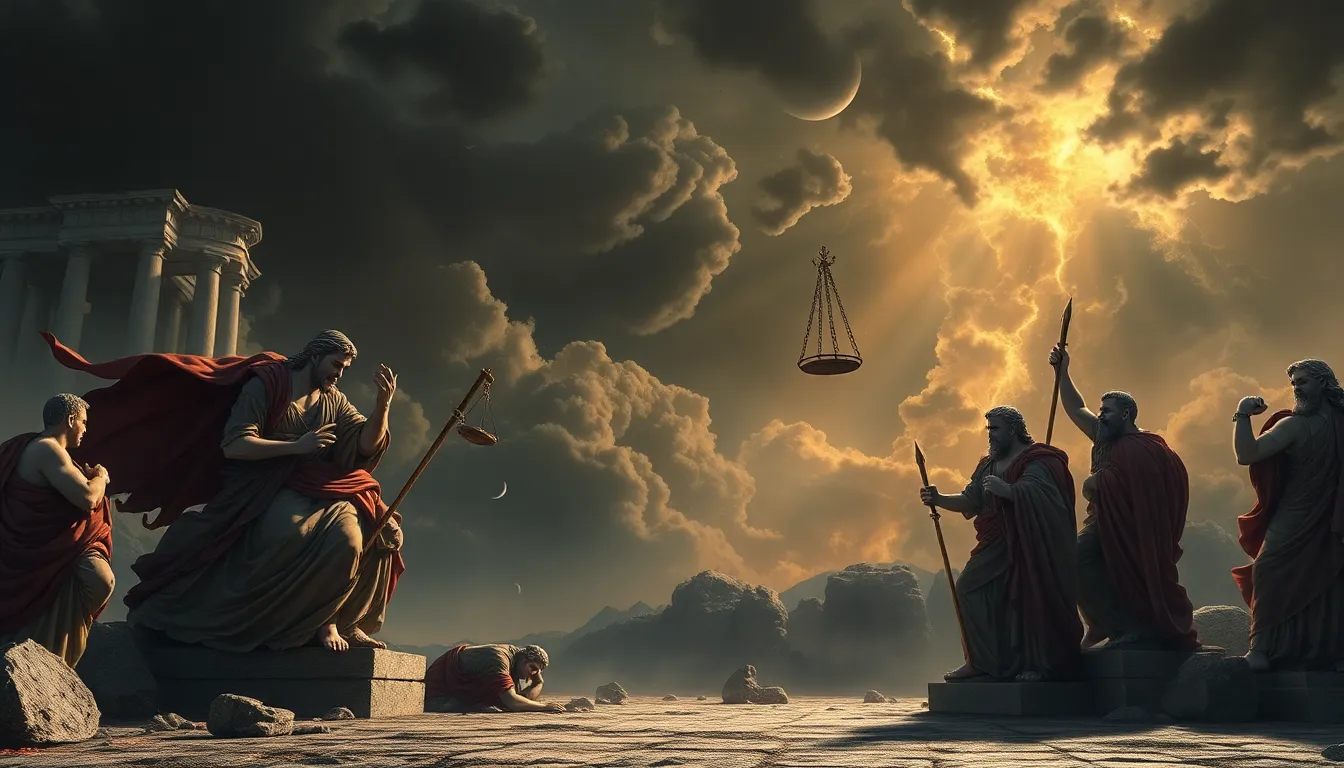Divine Retribution in Greek Tragedy: A Study of Fate and Justice
I. Introduction
Divine retribution is a fundamental concept in Greek mythology and tragedy, encapsulating the idea that the gods enforce justice by punishing wrongdoing, often in a manner that reflects the severity of the offense. In the realm of Greek tragedy, this notion intertwines deeply with themes of fate and justice, creating a rich tapestry of moral dilemmas and human suffering. This article will explore how divine retribution operates within Greek tragedies, the impact of fate on human lives, and the moral implications that arise from these narratives.
II. Historical Context of Greek Tragedy
The origins of Greek tragedy trace back to the 6th century BCE, evolving from earlier forms of storytelling and religious rituals dedicated to the god Dionysus. Tragedy became a prominent form of entertainment and moral reflection in ancient Greece, often performed during festivals and competitions.
Key playwrights such as Aeschylus, Sophocles, and Euripides significantly shaped this genre:
- Aeschylus: Often regarded as the father of tragedy, Aeschylus introduced the second actor, allowing for complex dialogues and themes of divine justice.
- Sophocles: Known for his exploration of character and moral ambiguity, Sophocles’ works often highlight the struggles of individuals against fate, as seen in plays like “Oedipus Rex.”
- Euripides: Euripides challenged traditional beliefs and introduced strong female characters, questioning the morality of the gods and the concept of retribution.
In Greek society, the gods played a central role, embodying both benevolent and vengeful aspects, reflecting the complexities of human existence and the consequences of human actions.
III. The Concept of Fate in Greek Tragedy
Fate, or “moira,” is a defining element in Greek tragedy, signifying the predetermined course of events that individuals cannot escape. This inevitability is significant in shaping the tragic narrative.
Tragic figures such as Oedipus and Agamemnon exemplify the struggle against fate:
- Oedipus: Despite his efforts to avoid the prophecy of killing his father and marrying his mother, Oedipus ultimately fulfills it, highlighting the inescapable nature of fate.
- Agamemnon: His tragic downfall stems from his choices, yet these choices are heavily influenced by fate, particularly regarding the sacrifice of his daughter Iphigenia.
The interplay between individual choices and predetermined destiny creates a complex narrative that raises questions about free will, responsibility, and the role of the gods in human affairs.
IV. Divine Retribution as a Thematic Element
Divine justice serves as a critical theme in many Greek tragedies, where the gods administer punishment for hubris, moral transgressions, or defiance. The consequences faced by characters often reflect the severity of their actions.
Key tragedies illustrate this theme:
- “Agamemnon”: Agamemnon’s return home after the Trojan War is marked by revenge and murder, leading to his downfall orchestrated by the vengeful goddess, Artemis.
- “The Eumenides”: This play features the Furies, ancient goddesses of vengeance, who pursue Orestes for avenging his father’s murder, emphasizing the cycle of retribution.
The gods are depicted as active participants in the lives of mortals, ensuring that justice is served, often in brutal and poetic ways.
V. Justice and Moral Order in Greek Tragedy
The moral implications of divine retribution are profound, prompting audiences to reflect on the concepts of justice and order. The notion of ‘hubris’, or excessive pride, often leads to a character’s downfall, serving as a cautionary tale about the limits of human arrogance.
Key comparisons arise between human justice and divine justice:
- Human Justice: Often flawed and biased, reflecting the complexities of societal norms.
- Divine Justice: Seen as absolute and impartial, though sometimes arbitrary, reflecting the whims of the gods.
This dichotomy raises questions about morality, accountability, and the nature of justice itself.
VI. Character Analysis: Heroes and Anti-Heroes
Greek tragedies are populated with complex characters who embody both heroic and anti-heroic traits. Characters like Oedipus and Electra face moral dilemmas that challenge their perceptions of right and wrong.
Oedipus, for instance, begins as a noble king but becomes tragic as he uncovers painful truths about his identity and fate. His journey illustrates the catastrophic impact of divine retribution on his character development.
Electra, driven by vengeance for her father’s murder, embodies the struggle between familial loyalty and the pursuit of justice, illustrating how divine retribution shapes her destiny.
VII. Symbolism and Imagery Related to Retribution
Greek tragedies employ rich symbolism and imagery to convey themes of justice and retribution. Common metaphors include:
- Light vs. Darkness: Often symbolizes knowledge and ignorance, with characters facing the light of truth leading to their downfall.
- Blood: Represents guilt and the cycle of violence, as seen in the bloody consequences of revenge.
- Sacrifice: Highlights the costs of justice, whether through literal sacrifices or the personal sacrifices characters make in pursuit of retribution.
The emotional and psychological effects of retribution are palpable, as characters grapple with guilt, shame, and the inescapable consequences of their actions.
VIII. Conclusion
In summary, the exploration of divine retribution in Greek tragedy reveals a complex interplay of fate, justice, and moral order. Through the lens of tragic figures and their struggles, we gain insight into the human condition and the eternal questions of morality that resonate even today.
The relevance of Greek tragedy persists in contemporary discussions about justice and ethics, reminding us of the enduring legacy of divine retribution in literature and culture. Ultimately, these ancient narratives continue to offer profound reflections on the consequences of human actions and the quest for understanding in a world governed by both fate and divine will.




